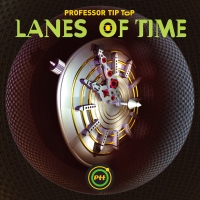Featured artists: Professor Tip Top | Beledo | Existenter | Ikitan | Straytones ||:
In this ADA (shorter reviews) update TPA’s Nick Hudson looks at five recent Albums, EPs & Singles from:
• Professor Tip Top – Lanes of Time
• Beledo – Seriously Deep
• Existenter – Revolution Against Evolution [Single] | Inverted Pyramid Trilogy [EP]
• Ikitan – Darvaza y Brinicle
• Straytones – Magic Green River Swimmin’ & Stunning Tarzanka Experience
Nick Hudson

2020’s Tomorrow Is Delayed was a new beginning for Professor Tip Top – and what a new beginning! New vocalist Sonja Otto really made her presence felt; she couldn’t really be more different from previous vocalist Svein Magnar Hansen, and her vocals made the album their best yet, for me. The problem then becomes, how do they top that? Well, Professor Tip Top deftly sidestep that obstacle by taking a different direction. While it’s not the clichéd sophomore slump, Lanes of Time never reaches the same heights as Tomorrow Is Delayed – but nor does it attempt to. I admit, because of this, I found the album a little underwhelming on first listen, but it didn’t take too long to reveal its charms. Lanes of Time is less direct than its predecessor, and far more subtle. Otto has an incredibly strong voice, but even her singing is somewhat toned down for this release.
I wrote in my review of Tomorrow Is Delayed, that The Ghost Within slowed down the pace of that album, and was possibly my least favourite track as the band never seemed to reach full gear. It might then seem strange that I enjoy a whole album that is more akin to this song than the other tracks from Tomorrow Is Delayed, but I think it is because it is the whole album, and it simply flows beautifully. While I was picked up and swept away by the music of Tomorrow Is Delayed, with Lanes of Time I simply drift along with the music. It reminds me of the “lazy rivers” that you can find in some swimming pools. The music is immersive, and takes you along with it, as it gently flows onward at a comfortable pace.
Once again, and as always, the guitar playing of Sam Fossbakk is sublime. Caught somewhere between Andy Latimer and David Gilmour, while never sounding too much like either, his playing is simply superb. As great an addition to the band as Otto, Professor Tip Top would be nothing without Fossbakk, and when he gets going it’s a real treat for the ears. The Quest Remains is the album’s centrepiece, obviously by virtue of its position on it, but also because the extended instrumental passages are so incredible. The way it is followed by the far more calm and delicate guitar introduction of Shining is magical. It’s languid and lugubrious, which creates far more impact when Past Forever kicks in.
This short track (one of two similar, bookending what is effectively the final song of the album) is quite stunning, and quite a deviation in sound from anything on this album, or it’s predecessor. I’m glad it’s short, though, as it does come closer to feeling out of place. Any longer, and I have a feeling it would have the same effect for me that The Ghost Within had on Tomorrow Is Delayed. I definitely far prefer its counterpoint, Time Is, and in fact this is one of my most favourite moments on the album. I think I’d probably rather have had Past Forever left off the album, and Time Is developed into a full song. But ultimately, that’s my only gripe, and it’s neither a big nor serious one. I’m more than happy to drift along these Lanes of Time…
Nick Hudson

I have a confession to make: Seriously Deep is a wonderful album, and I’m frustrated by my inability to write the glowing review it deserves. This is a review I should be able to write easily and enthusiastically, not least because I loved Beledo’s last MoonJune release (Dreamland Mechanism), but simply because I have had a love for almost all things MoonJune for years. In 2020, it was a MoonJune release which topped my album of the year list (Dwiki Dharmawan’s Hari Ketiga), easily and by quite some margin. Seriously Deep is by no means a lesser album than its predecessor. Indeed, it’s an album that at another time I would probably rave about. But the problem with any music (and therefore writing about it) is that how it can effect the listener comes down as much to how the listener feels at any given time, as how affective it is, per se.
I have always gone by the theory that if I have nothing nice to say about a release, I will not review it. I am not a fan of negative reviews, and don’t ever want to have to write one. That’s not really the issue here. There’s nothing negative I could say about the album, at all. I mean, just look at the line-up! The main players here are Beledo, Tony Levin and Kenny Grohowski. I could write some nice things about this album, but the problem is, that’s all they’d be – nice. There would be nothing meaningful about the words. Nothing of substance. I fear the nice words might read more like a series of platitudes and clichés. And this album doesn’t deserve that. It’s a good album. I‘m just not feeling it, and I know no words I write will do it justice. I don’t want to write a shallow review for Seriously Deep. Yet here we are…
I have come to think that my dearth of words is actually a death of words – by drowning. You see, Seriously Deep may be just that, and I simply let myself drown in it every time I listen. I’ve read that if you’re able to simply let yourself go, drowning is the most peaceful way to die. I don’t know how this can be known, but as an analogy it works. No matter how I might try to stay on the surface, and listen to the album with an ear to review it, I find myself sinking deeper and deeper, and simply letting myself go. By the time I know it, the album is over, and once again I’ve failed to note down anything about it. So this review might not be great, but the album is. I’ve listened to literally hundreds of 2021 releases, and Seriously Deep is in my (admittedly still long) short list for my album of 2021. I guess you may just have to listen for yourself.
Inverted Pyramid Trilogy [EP]
Nick Hudson
![Existenter – Revolution Against Evolution [Single] | Inverted Pyramid Trilogy [EP] Existenter – Revolution Against Evolution [Single] | Inverted Pyramid Trilogy [EP]](https://theprogressiveaspect.net/wp-content/uploads/2022/02/Existenter_ADA.jpg)
I ended my review of Existentia’s album, The Planet in the Universe with the words, “Overall this is a stunning debut, and I can’t wait to hear what’s next!”. But I’m not sure I would have ever expected what did happen next. Presumably due to the US brutal/tech death metal power trio of the same name, the Russian Existentia changed their name to Existenter. Given that the US trio are a newer band than the Russian (albeit only by a few months), it’s a shame it played out this way. While Existenter worked on their second album, they wisely decided to create as much attention as they could for their new identity, releasing first a stand-alone single (Revolution Against Evolution) and now a three track EP (Inverted Pyramid Theory). I was fully with this strategy, as I loved the debut album, and I was under the assumption that none of these four songs would appear on their second. I’ve since found out that they will, and as I am not a fan of listening to songs outside the context of the album they come from, it leaves me a little disappointed. Especially when these two releases do work wonderfully without being part of a greater whole.
For example, despite its heavy introductory notes, Revolution Against Evolution quickly becomes the most accessible and mainstream song I’ve heard from Existenter. It’s radio ready, with an almost poppy and certainly anthemic earworm of a chorus. Written in the aftermath of George Floyd’s murder in the US, it’s a rousing, positive, and upbeat track that doesn’t really have much similarity to anything else from the band, but is a great track in itself. I wouldn’t want to hear a whole album in this style, but as a stand-alone single, it works wonderfully. It will be interesting to hear how this single works within the greater frame of an album.
Then again, despite the fact that the message of Revolution Against Evolution may have an obvious origin, and be delivered in a different style from Inverted Pyramid Theory, all four songs maintain a continuity of the overall statement first made by Existenter on The Planet in the Universe, that we are losing the balance and equilibrium required for humans and Mother Earth to exist together without damaging each other. If we do not attempt to keep the balance, we have no future. But rather than a bleak certainty, Existenter provides a message of hope. We can change. We can make a difference. These four songs suggest that part of the problem is that we have alienated ourselves (in part through technology), which has rendered us somewhat blind to the plight of others, let alone Mother Earth.
The three songs of Inverted Pyramid Theory are interconnected to form parts of a greater whole, revealing Existenter’s belief that we’ve tipped the balance so much, that we’ve inverted the pyramid of human needs and values. There are several theories which illustrate this hierarchy (eg Maslow’s), and Existenter propose that as technology and social media have taken over our lives, our lives have suffered because of the distortion of basic needs and values that have consequently occurred. While The Planet in the Universe pointed out that time is a non-renewable resource, and we needed to do what we can to save Mother Earth sooner rather than later, Inverted Pyramid Theory reduces this to a more personal level. Time is a non-renewable resource, and how much of it are we spending online and on social media, rather than actually living and connecting in the “real” world. As with their debut, the concept is heavy, but Existenter pull it off with a deftness and lightness of touch. If this is a taste of what to expect from the upcoming second album, I’m in!
Nick Hudson

Italian post-rock band Ikitan burst onto the scene in 2020 with their 20-minute and 20-second epic titled, obviously, 2020. At the beginning of last year they performed that piece live for the first time, in an old fort on top of a mountain, where it was filmed and recorded. And at the tail end of the year, Ikitan released their first new material – a double single named Darvaza y Brinicle. The two tracks that make up this release both complement and contrast with each other, flowing around and against themselves like a yin yang in music. Symbolic of fire and ice, the character and sound of Darvaza and Brinicle are pretty much exactly what you might expect to hear. But rather than being in opposition to each other, Ikitan concentrate on their points of similarly, rather than differences. Ikitan have very successfully represented two different yet complementary natural phenomena in music – in their own words, both “devastating and powerful, but ethereal and dream-like at the same time”.
Darvaza is an enormous burning gas crater in Turkmenistan, also known as ‘The Gates of Hell’. Once set alight decades ago, its fire has been self-sustaining, and it has been burning continuously ever since. The music is dense with Tool-like heaviness and atmosphere (and, yes, you’re right – that’s not the first time I’ve compared Ikitan to Tool, and it’ll likely not be the last either). There’s a great sense of restrained pressure, as if the whole thing is going to explode, and if it did it would simply be devastating. But, instead, as the piece progresses, a lot of that pressure seems to resolve itself and dissipate. While the beat burns on, the sense that this is something awful has gone by the end, and Darvaza concludes on a far more positive note that one might have expected from its beginning.
This leads very nicely into the cool, calm and watery sounds that introduce Brinicle. A brinicle is a brine icicle of supercooled, supersaline water that flows downwards in a self-sustaining manner. This is the most obvious point of similarity between a brinicle and Darvaza, and one played out very well in music by Ikitan. The use of repetitive grooves that build upon themselves to make something greater is well used in both tracks. Post-rock often features crescendos, but Ikitan have utilised them in a quite unique way, and where most post-rock follows a crescendo with a climax, Ikitan have not in either of these tracks. It’s subtle, but it works so well to convey the comparisons of these two phenomena, within two otherwise quite different pieces of music. But what’s really cool is the way Brinicle develops, so that by its end, the release has come around full circle. If you play Darvaza after Brinicle it follows as perfectly as Brinicle does after Darvaza. The two flow together so easily and pleasingly that they almost segue. While their discography is hardly vast, Ikitan haven’t put a foot wrong yet, and I can’t wait to hear what’s next!
Nick Hudson

I’d not heard of Ukrainian band Straytones until their lengthily titled 2021 release, but I’ve since become fairly well acquainted with all their releases on Bandcamp. They all have their charms, and are all surprisingly different. While all Straytones releases mine the same psychedelic territories, there are many facets to the sounds they dig up. Over the course of their discography, I am reminded of all manner of different bands from different eras: Jefferson Airplane, White Stripes, Tame Impala, Pixies, QOTSA, King Gizzard, and bands from the Paisley Underground, among others. However, with Magic Green River Swimmin’ & Stunning Tarzanka Experience, I find myself hearing for the first time in their music a band I doubt Straytones are even familiar with – Straitjacket Fits. This is Dnieper sound meets Dunedin Sound, and I love it. (And it’s a lovely coincidence that in terms of a body of water, sound comes from an Old Norse word that means Swimmin’).
But then, is the Green River of the album the Dnieper at all? The Dnieper does often appear green as, unfortunately, it’s extremely polluted. The Dnieper is often green due to algal blooms caused by a high concentration of phosphates in the river. In 2020, it is estimated that approximately 6,000 tonnes of phosphate were released into it. On 29th June 2021, the Ukrainian government labelled the ecological state of the river as catastrophic, and banned swimming in it due to the health hazard. Thanks to continual pollution over many years, even with proper treatment it will take decades to make the river healthy again. So, no Swimmin’ allowed! And yet in the cover art and the music, all is not only well but positively jubilant. I suspect the Green River in the title is more an allusion to the Creedence Clearwater Revival song, as much as it is to the Dnieper itself.
It’s quite neat, because just as CCR’s song seemed to be about the Bayou, John Fogerty has since explained that “Green River is really about this place where I used to go as a kid […] Lot of happy memories there. I learned how to swim there. There was a rope hanging from the tree. Certainly dragonflies, bullfrogs.” In other words Green River was about nostalgia, and viewing what is around you with rose-tinted glasses that show fond memories from a less troubled past. One can imagine the members of Straytones on the bank of the Dnieper, recalling how summers must have once been, and seeing everything from a different angle, and, boom!, that’s the cover art right there, and the music naturally follows.
There are the happy memories, dragonflies and bullfrogs Fogerty spoke of. You can even see someone enjoying their Tarzanka Experience in the top right corner, and the music is as vivid and vibrant, and as happy and carefree, as the cover art. Magic Green River Swimmin’ & Stunning Tarzanka Experience is an immersive album that allows listeners to drift off into a psychedelic wonderland where happy memories blend with the present. It’s a captivating daydream of an album, wispy and ephemeral, jangly and joyful. Despite the lengthy title, this is an unpretentious, idyllic, and even heart-warming album, which is easy to listen to. Is it my favourite Straytones release? I haven’t quite decided, but it is certainly a contender for that honour.

